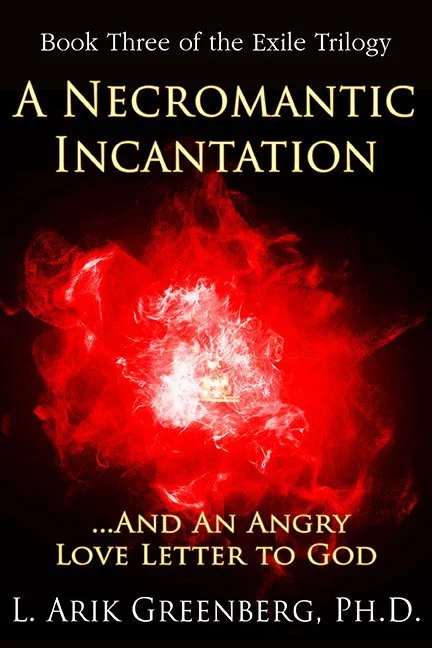A Necromantic Incantation…And an Angry Love Letter to God (Book Three of Exile Trilogy)
As a college professor, Dr. Arik Greenberg had studied religion all his life, earning advanced academic degrees in his field. But none of this would sufficiently prepare him for his true spiritual journey. In The Exile, the first book of a trilogy, his challenge was to rescue the family home from his mother’s deadly compulsive hoarding, and to protect his parents from their mental illnesses, borne out of a family legacy of abuse. In book two, I Am the Exile, he dealt with the untimely deaths of his parents and cleared out the family home to prepare it for rental, coming to grips with the lingering residue of his mother’s hoarding.
In book three of the Exile Trilogy, Arik continues his journey to save his family home from financial ruin, becomes a national leader in the movement to unionize adjunct faculty in higher education, and ultimately seeks to reconfigure and restore his ailing relationship with God.
His journey would lead him from a simple, trusting, ingenuous faith—through stages of doubt, anger, and Job-like questioning—and ultimately to a more complex and nuanced relationship with the Divine.
Reviews
★★★★★
The final book of Dr. Greenberg's trilogy is passionately written and can stand alone for those interested in an imaginative spiritual exploration of the problem of theodicy. It is critical of a simple faith and trust in a beneficent God, but instead expresses a deep anger towards God in response to the question of "why do bad things happen to good people?" In that sense, the book is opposed to long-held Christian doctrine regarding the nature of humankind which required the atonement for sin by Christ. Greenberg embraces New Age theology, apocryphal gospels, world religions, mysticism, and the ancient heresy of Gnosticism. It is a fascinating point of view for those trying to understand human suffering through the lens of modern therapeutic therapy which emphasizes the value of self-esteem. But for those who long for the life to come and the post-mortem existence of the soul where sin and suffering are no more, that is for another book.
— Jane H.

